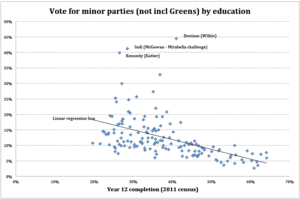
Crispin Hull: Portico
Monday September 16 2013

Forum for 14 September 2013 senate
Something more serious is going on than a few yobs exploiting a defective Senate voting system.
The system’s defects are obvious. The solution is equally obvious. Remove the system whereby political parties lodge preferences with the Australian Electoral Commission. In its place allow people to indicate their own preferences for political parties above the line. Also make it optional preferential requiring, say, six preferences for a valid vote – either above or below the line. And require an independent or group to attain a quota of, say, 4 per cent of the vote, otherwise eliminate them on the first count.
No, the more interesting questions are why did so many people vote for these fringe parties and why did a record number of people vote informally this time around. To help answer these questions I am indebted to some as-yet-unpublished research by Ian McAuley, a professional associate at the University of Canberra and a fellow at the Centre for Policy Development (www.cpd.org.au). He looked at the House vote, rather than the Senate vote because it reveals more -- the House vote can be matched with census data for each electorate.
He found – while he was looking for something else, incidentally -- a strong correlation between low education and a higher vote for the minor parties (excluding the Greens) – let’s call them the shrapnel parties. He mapped all 155 electorates with census data for the percentage of adults with Year 12 or higher educational achievement. He found the smaller the percentage of people with Year 12, the higher the vote for the shrapnel parties. Year 12 attainment ranges from 22 per cent to 64 per cent across the electorates. About a quarter of the seats with 46 per cent or more with Year 12 all had a shrapnel vote of less than 10 per cent.
Our seat of Leichhardt, for example, has just 35 per cent of voters with Year 12 and a large 15.4 per cent vote for the shrapnel parties. Sure, Year 12 is not a perfect measure, but it is the only one. And it is helpful because lower education also correlates with a lot of other things: lower incomes; poorer health; social exclusion; geographic isolation. These things are also associated with political disaffection. Without compulsory voting perhaps these people would not have voted at all. But dragged to the ballot box this time, they rebelled against the traditional institutional framework of the major parties in greater numbers than ever.
We have compulsory voting to include everyone and to legitimise the result, so it is a pity that other elements in the political system are exclusionary and delegitimise it – such as people with fewer than 2000 votes getting a Senate seat. Also this election, the informal vote hit a record of almost 6 per cent.
So, just changing the electoral system will not fix the underlying and growing problem of political disaffection. That is not to reject fixing the Senate voting system. Bear in mind that the system is a creature of major-party shenanigans in the mid-1980s. They thought the system of preference registration would benefit them – quite wrongly as it turns out. The system is quite undemocratic. It takes preference allocation out of the hands of voters and into the hands of parties. My guess is that, under this system, the Motoring Enthusiast would have still been elected even if the now-famous Facebook video of the kangaroo-poo fight had been shown BEFORE the election.
In all, McAuley’s research points to a group of rural, regional and outer-city voters being disaffected with a more-educated and growing inner-city elite. Interestingly, when you look down the occupations on the lists of candidates you see how the major parties, especially Labor, are full of political staffers, union officials and lawyers. That is combined by tight party discipline and concentrated power. Small wonder people feel excluded.
So it is going to be in the hands of the major parties not just to rejig the Senate voting system to make it more difficult for single-issue parties, but to reform themselves so they are more attractive to people whose concerns are not being met and have expressed their disaffection by voting for hunting, shooting, fishing, motoring, the family, right-wing crackpots and sport.
One spin-off from the shrapnel parties’ success is an end to one of Prime Minister-elect Tony Abbott’s predictions. He said Labor would not block the repeal of the carbon tax in the Senate and cause a double dissolution because it would not want “to commit political suicide twice”.
However, Labor now has just 25 Senators. In a double dissolution (perhaps with an already changed voting system) it would certainly do better than that. It would have the added advantage of clearing out the Senate rabble before they had a chance to take their seats on July 1 next year. So expect Labor to stand its ground on the carbon tax, so there will be no repeal until at least this time next year. By then Abbott might see the advantage of the large budget saving of abandoning his “direct action” and leaving the tax in place. After all, it has substantially cut carbon emissions; saved business more than it has cost by encouraging them to use energy more efficiently; and given Australia higher international standing.
Abbott could save face by saying he tried his best to get support from the minor parties in the post-July Senate but they would not agree – easy enough to arrange. So watch as pricing carbon and climate change remain pivotal forces in Australian politics as they have been since 2007.
